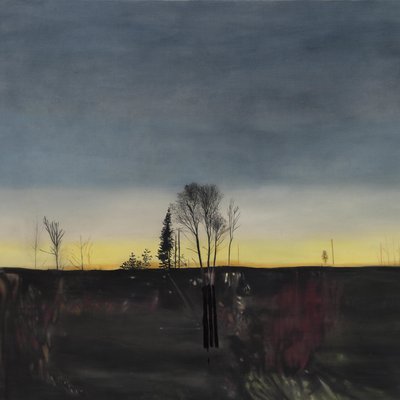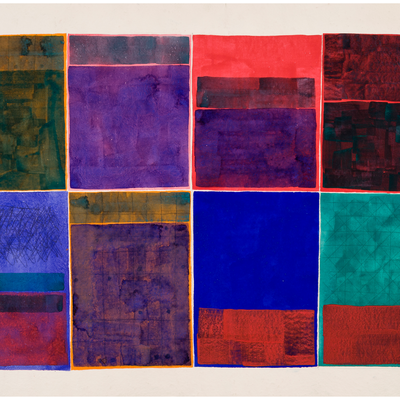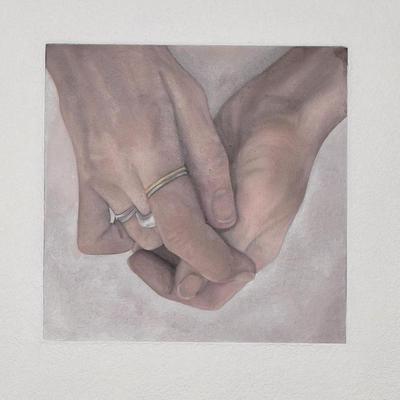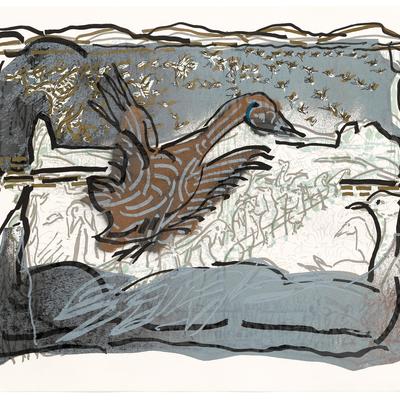“We will never be able to understand a plant unless we have understood what the world is.” — Emanuele Coccia
Terrains vagues
The group of paintings on view in this exhibition, each of which is entitled Terrain vague, is piece and parcel of a larger, herbal cosmos created over the course of one year. Marking the end of the pandemic, the year 2022 was decisive in the making of this body of work, presented for the very first time at Galerie Simon Blais. While society at large and the art world in particular were eager to return to “normal,” Natalja Scerbina, in need of reckoning and reuniting with nature after feeling its absence, ventured outside, perusing the island of Montréal in search of the metropolis’ post-industrial wastelands. On her walks through Montréal’s back alleys and unoccupied public spaces, the artist collected the weeds and herbs usually ignored by passersby and pulled out by gardeners. The plants found on those field trips served her as model and material for her flower paintings.
The Spanish architect and theorist Ignasi de Solà-Morales used the French term terrain vague [wasteland] to identify mutations and fluctuations in the urban space. Considered unproductive and alien to urban planning, such “terrains vagues” are spaces of freedom within a city. But their status is momentary, as they are ready to be exploited through construction. By tending to them, Natalja Scerbina became intimate with these empty urban areas, discovering what’s left growing on them once architecture and industry have released them. What she found was a fertile ground for not only weeds but also medicinal plants like wood sorrel, valerian, cowberry, verbena, nettle, creeping clover, dandelion, milk thistle or common fennel. Versed in the plants’ medicinal, savoury and aromatic qualities, the artist chose these herbs to create a collection of flower paintings.
Natalja Scerbina’s artistic practice of the last decade provides evidence of her interest in the human-nature relationship. She has previously explored the human genome, archaeology, astronomy and ecology in her painting. With her most recent series of Terrains vagues, she connects that practice with a long tradition of flower painting by women artists. And yet, Scerbina’s herbarium is not meant as a source of taxonomic studies but to establish, through plants, a direct connection with life in this world. In turn, the artist relates to plants through the medium of paint. In the process, the plants collected on Montréal’s wastelands served not only as models but also as matrices and stencils, leaving their imprint—or only their shadow—on the coloured surface. Scerbina’s often dark surfaces absorb the plants, as if hiding them, but they are actually waiting to be discovered, inviting the viewer to come close. Brighter pigments are applied with a paint gun, adding colour and contrast. With her flower paintings, Scerbina tends to a form of life on earth that rarely receives humanity’s attention or empathy. In the time of the Anthropocene, turning attention to plants becomes a practice of care. Looking at her paintings, Natalja Scerbina’s focus on the nature of plants helps us perceive the vulnerability, dependence and interdependence of our relationship with nature.
About the artist
Natalja Scerbina holds a bachelor’s degree in Art History and Visual Arts from Concordia University. Her work has been shown in solo and group exhibitions since 2006. Most recently, it was included in the exhibition Outside the Frame: Works by Artists Among Us, which was presented at the Montreal Museum of Fine Arts in September 2021. De nos gestes fragiles marks the beginning of her collaboration with Galerie Simon Blais.







